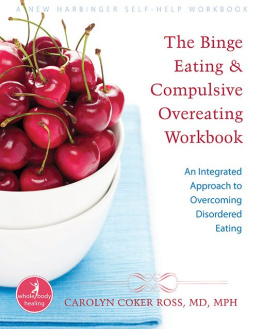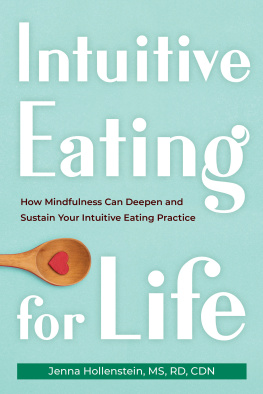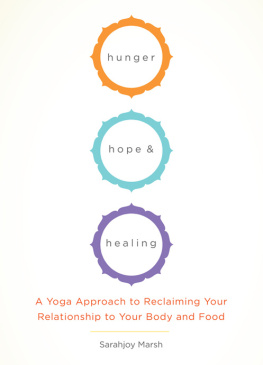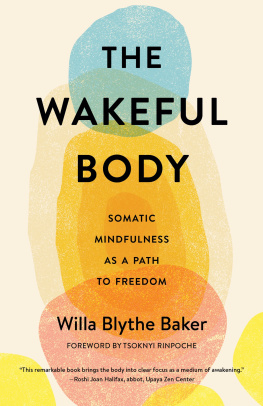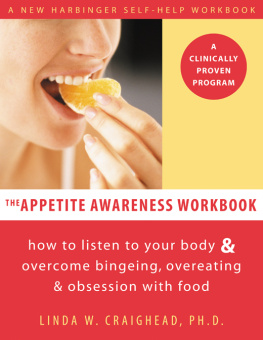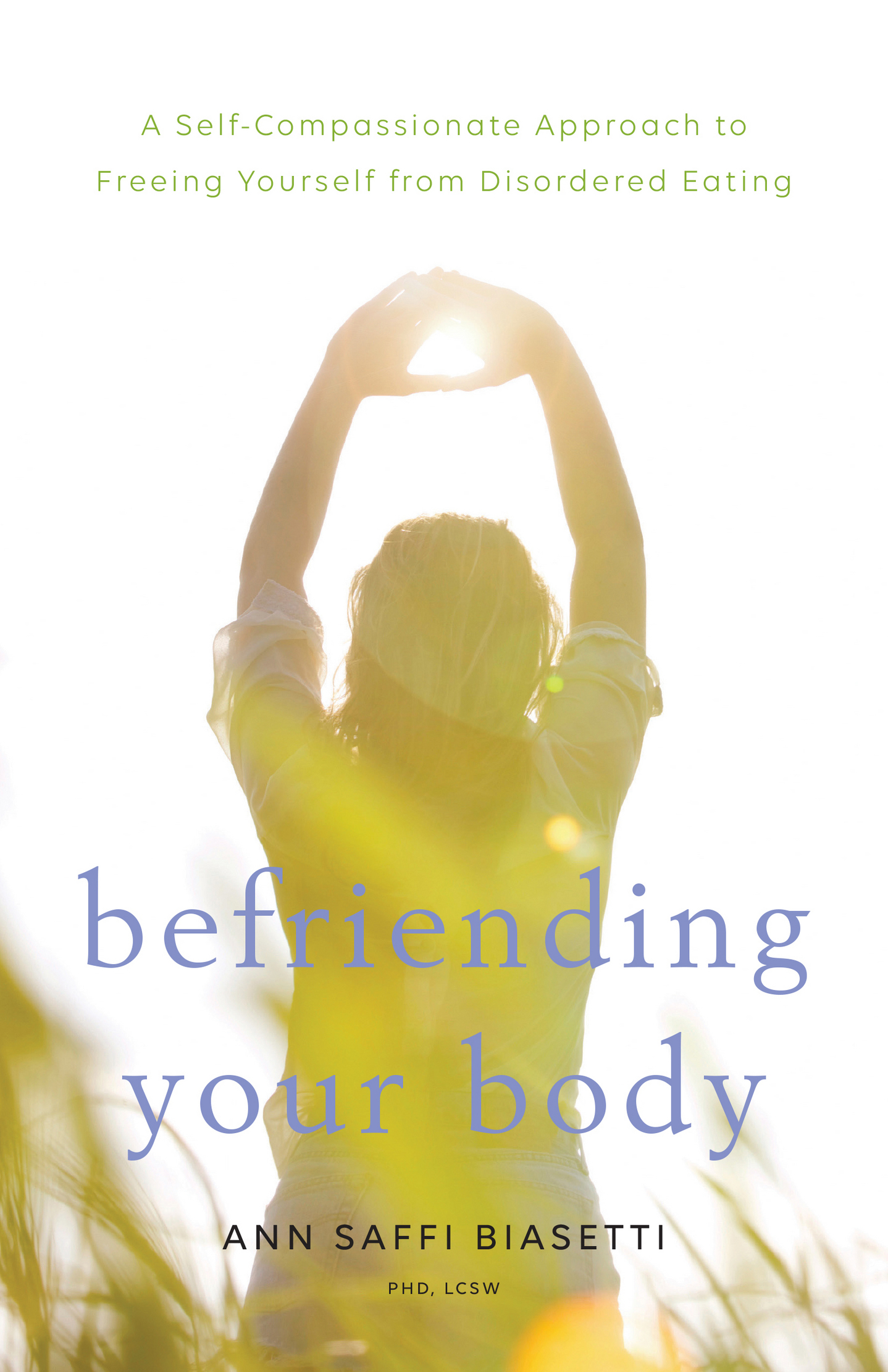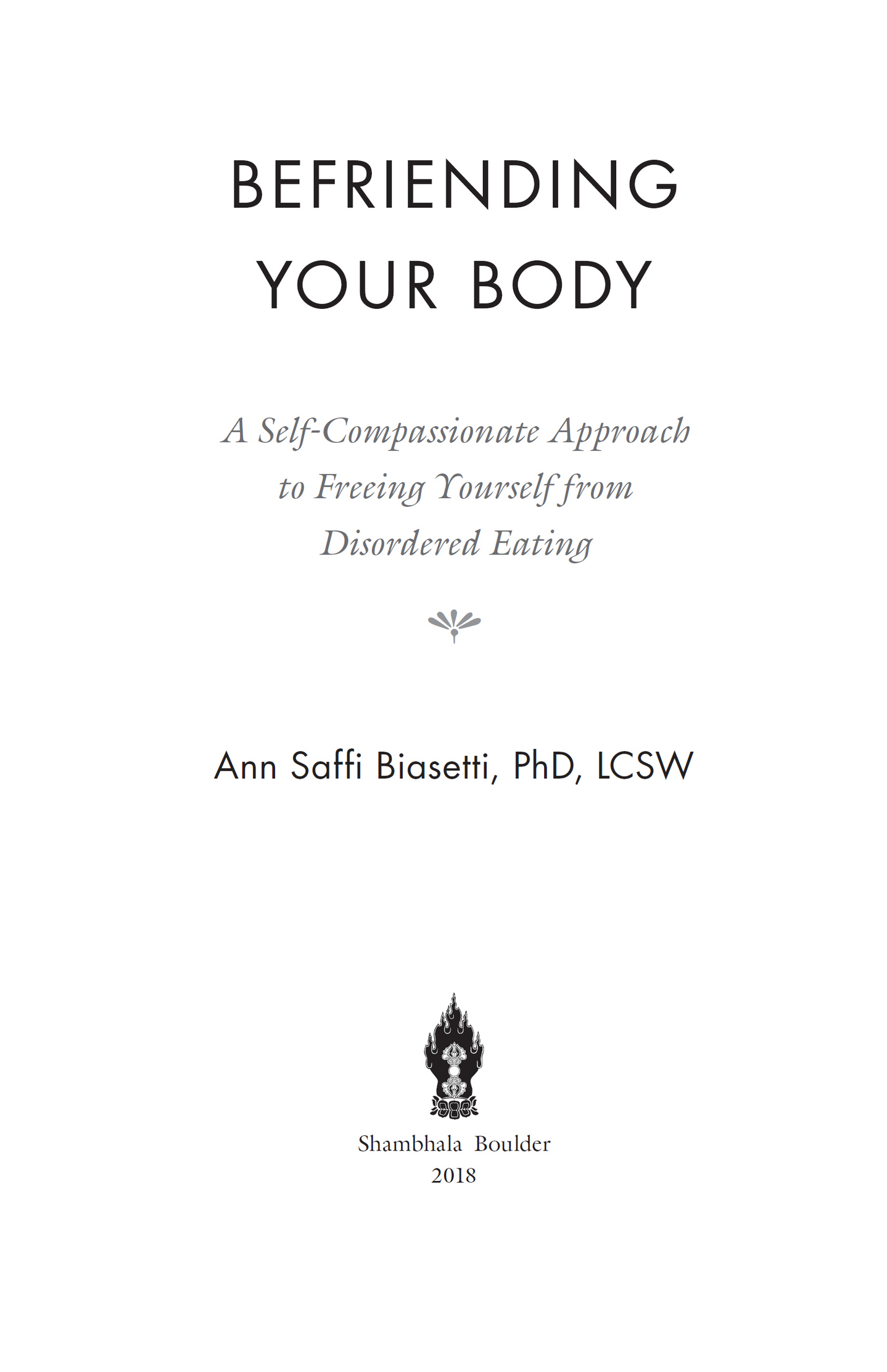Shambhala Publications, Inc.
All rights reserved. No part of this book may be reproduced in any form or by any means, electronic or mechanical, including photocopying, recording, or by any information storage and retrieval system, without permission in writing from the publisher.
Ebook design adapted from printed book design by Greta D. Sibley
Names: Biasetti, Ann Saffi, author.
Title: Befriending your body: a self-compassionate approach to freeing yourself from disordered eating / Ann Saffi Biasetti.
Description: Boulder: Shambhala, 2018.
Subjects: LCSH: Eating disordersTreatmentPopular works. | MeditationTherapeutic usePopular works. | BISAC: SELF-HELP / Eating Disorders. | PSYCHOLOGY / Psychopathology / Eating Disorders. | PSYCHOLOGY / Psychotherapy / Counseling.
Foreword
T HERE ARE THOUSANDS OF INDIVIDUALS who struggle daily for a way to exert control over themselves, believing they will find true happiness once the body has been thoroughly buffed, sculpted, exercised, and denied nourishment. Yet, these individuals, primarily girls and women, remain dissatisfied and frustrated in their quest for perfectionthe high is never high enough, the scale is never low enough, and the image in the mirror is never good enough. It is ironic that, as obsessed as we are with our bodies, we do not have a sense of living in the body or being connected to it, and that is where the real problem lies. For how can we not recognize the importance of the body and the knowledge it holds? The body cries in pain or sorrow, trembles in anger, jumps for joy, leaps with excitement, smiles with pleasure, and yearns for connection. From the moment of birth, the infant begins a relationship with her body and delights in each journey of discovery and exploration. The language of the body is our first language, nonverbal signals and sounds that communicate our needs to those closest to us and create a dance of connection and communicationa high-pitched cry, a frowning face, a wide-eyed glance, a goofy smile. Does it not stand to reason that the body never loses its power to inform, express, and connect?
Befriending Your Body is a book whose time has come. Individuals who have been wounded emotionally, physically, or spiritually often detach from their emotions and body sensations when they are unable to find a vehicle for expression, and, although symptom management and talk therapy are useful strategies for change, they are not able to reach the stories, experiences, and emotions embedded in the muscular tissues, organs, and cells of the body itself. Essential elements for lasting change must include somatic (body) methods that make it possible for individuals to discover, accept, and express feelings and sensations that have been so long buried that they become imprinted in mind and body.
Body-focused methods for healing are able to directly access much of our emotional history and the perceptions of ourselves that have become frozen in our physiology. Understanding and working with the body provide the freedom to gain distance from imbedded perceptions and patterns through which we have learned to experience the world.
The rituals and obsessions that keep us stuck in patterns that are not life-affirming can be powerfuleach time we think or rethink a belief or event, that memory is strengthened through repetition and reinforcement. Repetition of messages and experiences over time become internalized and influence not only our self-perception and self-talk but even the body itself. Repeated negative self-talk becomes so familiar that it feels true and, thus, becomes part of ones identity. Words, like disgusting, worthless, gross, and repulsive, are not merely feelings but become part of a belief system of who I am. A former client of mine, Marie, consistently referred to herself as short, fat, and ugly. At forty-five, Maries litany of those three terrible words over time had lost any shock value it might have held for her. Maries body itself, as if literally listening to her punishing mantra, had taken on a hunched, squat pose, and her facial scowl served as a rigid boundary to keep others at a distance, thus confirming her belief that she was unacceptable.
For many, memories and emotions relegated to a place far from consciousness continue to influence their thinking, behavior, and identity, as if they were still at work. It is not necessary for there to be language to evoke a memory or tell a story. There are sensations and experiences for which verbal description is not available or events that may have taken place before one had even learned any language. Yet, expression is essential for healing. The American artist Edward Hopper wrote, If I could say it in words there would be no reason to paint, indicating art as his vehicle for expression. The body, as a vehicle for expression, must be approached with respect, safety, care, and patience. The bodys felt sense is accurate and true, but the body will not give up its secrets if treated poorly.
The concept of Befriending Your Body directly addresses and counters the body loathing that has emerged in the global culture over the last twenty yearsthe body as enemy, not ally. The body is seen as needing constant improvement, body part by body part. Advertising and corporations make even the most confident of us insecure by bombarding us with products that promise happiness and popularity while whittling away at our uniqueness and individuality. The quest for perfection, whether it be about our eye color, breast size, skin tint, or the size of our nose or genitals, lays the groundwork for negative self-talk (as if that will motivate us to work even harder to be perfect and fit in). Heightened attention to the body and insecurity about appearance are fueled by perfectionism and add another dimension to the cultivation of body dissatisfaction by modifying the perceptions of the aspired-to ideal body. Perfectionism is generally understood to encompass rigid expectations of performance and success directed toward self and others.
Self-compassion, on the other hand, is a critical component in changing this dangerous erosion of our very core. Self-compassion allows you to be your own best friend. As Buddha is believed to have said, You, yourself, as much as anybody in the universe, deserve your love and attention. One study of 153 female undergraduate students, conducted by investigators at the University of Waterloo, found that regardless of their weight, women with higher self-compassion have better body image and fewer concerns about weight, shape, or eating. Moreover, the results indicated that self-compassion helps girls cope with daily stress, including personal disappointment and setbacks, and offers unique benefits not found with self-esteem. These points are critical; they address both the feelings of isolation that breed in an atmosphere of not being good enough as well as the drive to pursue perfection at all costs.


